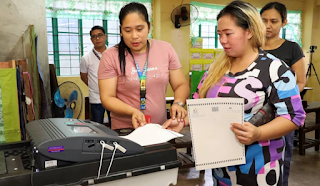 |
|
Photo courtesy of ABS-CBN News |
The hyperlocal polls, which go by the official name of Barangay and Sangguniang Kabataan Elections (BSKE), is set for October 30 of this year. Under the law, the BSKE is to be held every three years to choose grassroots leaders in 42,027 villages (barangays) across the country. Currently, the BSKE is still conducted manually and is plagued by problems of slow count, human error, and fraud.
The BSKE modernization initiative kicked off recently with mock elections in three pilot areas in and around the capital city of Manila. The successful exercise saw the return to active service of the familiar vote counting machines (VCMs), following a massive nationwide deployment in the 2022 general elections.
During the mock elections, Comelec Chairman George Erwin Garcia noted how automating the BSKE would speed up the process and make results available an hour after the polls close. Manual count is known to take days or even weeks to finish.
E-voting is also expected to reduce the risk of fraud and errors hounding BSKE. While manual elections are vulnerable to vote padding miscounting of votes and other anomalies, automated elections are more secure and reliable, as the votes are cast and counted electronically.
In addition, automated elections prove to be cost-effective in the long run, as they require fewer personnel and resources. The savings brought on by automation should be a welcome development for the national government.
Moreover, the automation of the grassroots polls is seen to immensely benefit electoral board members. While manual elections can be a long and tiring process for poll workers, who often must work for up to 24 hours straight, automated elections are much less demanding on election workers, as they only must operate the voting machines and do not have to manually count the votes.
The citizen watchdog Namfrel (National Movement for Free Elections), which was present as an observer in the mock elections gave its imprimatur on the initiative saying that automating the BSKE is “doable.”
The Comelec’s initiative to automate the BSKE represents a major step forward in upgrading the transparency and efficiency of the grassroots polls in the Philippines. With the benefits of automation trickling down to the most basic unit of government, the Philippines bolsters its standing as a primary reference for election modernization.
